W100F
The W 100 F’s hallmarks include high engine power, large milling depth and a broad range of applications. The machine’s high milling performance and compact overall dimensions ensure the fast completion of jobs when working in urban rehabilitation projects.
-
Removal at full depth
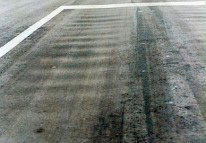
The machine’s maximum milling depth of 320 mm allows the entire pavement package, consisting of surface course, binder course and base course layers, to be removed in one single pass, which saves time and ensures high productivity.
-
Levelling surfaces
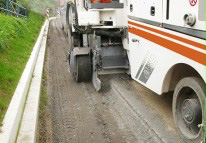
Wheel ruts, pronounced bumps or other kinds of deformation are potential risks to traffic safety. They can be eliminated very quickly by using cold milling machines equipped with specific fine milling drums. This method simply mills off the elevated sections of the road pavement, leaving behind an even and skid-resistant surface that can be used by traffic immediately.
-
Replacing the surface course
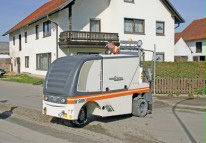
Replacing the surface course at milling depths of up to 4 cm is a typical application in road rehabilitation. In these projects, small milling machines are often used in combination with large milling machines: The small machines work in narrow passages, peripheral areas and around road fixtures, while the large machines mill off the large surfaces.
-
Cutting slots
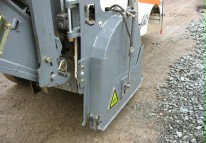
The W 100 F can be fitted with a narrow FCS milling drum enabling it to cut slots along a trench to be excavated. A significantly higher performance can be achieved at significantly lower tool costs when compared to cutting slots with a joint cutter.
-
Trench milling
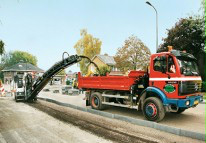
The W 100 F is eminently suitable for milling pavements in trench construction. In contrast to breaking the pavement with hydraulic hammers, the milled material can remain in the trench and can be used by traffic temporarily after light compaction. Disruptions to traffic are thus minimized.
-
Milling tie-ins
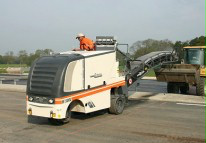
Prior to placing a new pavement, tie-ins to the existing pavement are produced at the beginning and at the end of the newly paved section of road. Milling wedged tie-ins permits a level transition to be produced when placing the new pavement material.
The same applies wherever rehabilitated pavements need to be placed to a specified level, for instance, with water gutters or rainwater inlets.
-
Rehabilitating industrial sites
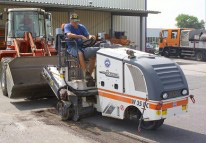
Small milling machines are eminently suitable for the fast removal of asphalt surfaces in or around industrial buildings that are either contaminated or in need of rehabilitation. Special preparations are not required. Milling in layers enables the small milling machine to precisely separate contaminated and non-contaminated material.
Fine milling
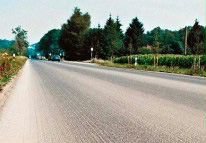
Fine milling drums are fitted with a much larger number of cutting tools than standard milling drums, which results in a much narrower tool spacing. Fine milling produces a very fine surface texture and is carried out at maximum milling depths of just a few millimetres or centimetres.
Typical fine milling applications include:
- Restoring the skid resistance
- Eliminating pavement irregularities
- Preparing surfaces for the application of new, thin pavement layers
- Specific alterations in the cross slope of a road pavement
- Removing coatings
- Removing contaminated pavement layers
Call Today : 403-226-6151
